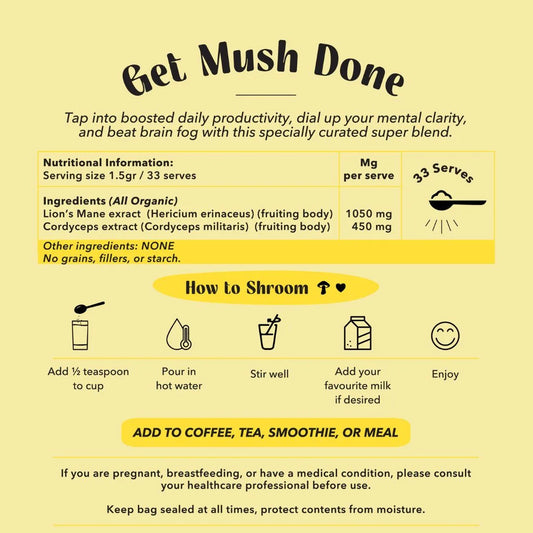In the vast kingdom of fungi, Lion’s Mane mushroom (Hericium erinaceus) takes the crown as the cognitive king for its unique potential to enhance brain health. This distinctive mushroom, named for its shaggy appearance resembling a lion’s mane, has been a staple in traditional medicine for centuries. Recent scientific studies have begun to unveil the mysteries of this remarkable mushroom, particularly its incredible benefits for the brain.
Understanding Lion’s Mane Mushroom
Lion’s Mane is not just another edible mushroom; it’s a natural nootropic, meaning it’s specifically beneficial for cognitive function, including for ADHD. Native to North America, Europe, and Asia, this mushroom has a long history of use in Chinese and Japanese medicinal practices.

Key Compounds in Lion’s Mane Mushroom
The brain-boosting power of Lion’s Mane can be attributed to two unique groups of compounds it contains: hericenones and erinacines. These compounds are known to stimulate the production of nerve growth factor (NGF), a protein that is crucial for the growth, maintenance, and survival of neurons.

Lion’s Mane Mushroom for Cognitive Health
The impact of Lion’s Mane on cognitive health is multifaceted and deeply significant. This mushroom is renowned for its ability to stimulate neurogenesis – the growth of new neurons – a process crucial for maintaining cognitive agility and preventing cognitive decline. Lion’s Mane also offers neuroprotective benefits, safeguarding neurons from damage caused by oxidative stress or inflammation.In terms of enhancing cognitive functions, regular consumption of Lion’s Mane has been linked to improvements in memory and concentration. This positions it as a potentially valuable tool in combating age-related memory decline and conditions like dementia and Alzheimer’s disease. Beyond cognitive abilities, Lion’s Mane also appears to positively impact mood and mental health. Research suggests that it can help alleviate symptoms of anxiety and depression, possibly due to its neurogenerative effects.
Supporting these claims, scientific research into Lion’s Mane has increasingly validated its traditional use as a cognitive enhancer. A pivotal study published in “Phytotherapy Research” in 2009 conducted a double-blind, placebo-controlled trial to investigate its impact on cognitive function. This study involved older adults diagnosed with mild cognitive impairment, who were given Lion’s Mane mushroom powder or a placebo over 16 weeks. The results were striking – the group consuming the mushroom showed significantly improved scores on the cognitive function scale compared to the placebo group. This improvement was observed during the treatment period but declined after supplementation stopped, suggesting a direct link between Lion’s Mane consumption and cognitive enhancement.
Another significant area of research, detailed in the “Biological & Pharmaceutical Bulletin” focuses on Lion’s Mane’s unique ability to stimulate the synthesis of nerve growth factor (NGF). NGF is a protein essential for the growth, maintenance, and survival of nerve cells, including brain neurons. The study found that bioactive compounds in Lion’s Mane, specifically hericenones and erinacines, actively stimulate NGF synthesis in the brain. This is crucial as NGF is vital for a healthy central and peripheral nervous system, and its decline is associated with neurological conditions like Alzheimer’s and other forms of dementia. Therefore, Lion’s Mane’s ability to boost NGF production offers potential therapeutic avenues for these conditions.

In Summary
Lion’s Mane mushroom is a natural, effective way to support brain health. With its potential to enhance cognitive functions, protect neural health, and improve mood, it’s a valuable addition to a brain-healthy diet. As we continue to explore the benefits of functional mushrooms, Lion’s Mane stands out as a promising ally in the pursuit of cognitive wellness and longevity.






